Exclusive: Xinjiang spokesperson dismisses Western reports
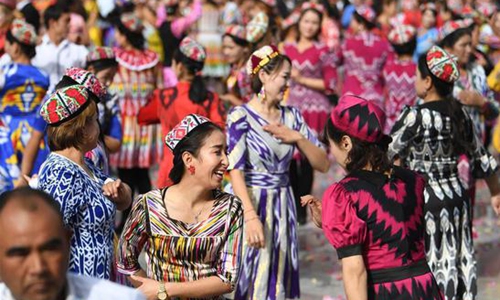
People attend a culture and tourism festival themed on Dolan and Qiuci culture in Awat County of Aksu Prefecture, northwest China's Xinjiang Uygur Autonomous region, Oct. 25, 2019. The festival kicked off recently in Aksu Prefecture. (Xinhua/Sadat)
Question: Recently, the ICIJ (International Consortium of Investigative Journalists) published an article about Xinjiang, illustrating the "personal experiences" of multiple victims including Mirigul Tursun and Shaylagul Sawutbay. They said that they were harshly mistreated in the "concentration camp," some "detainees" were hung on a wall and they were allowed no more than two minutes to use the bathroom, and at least nine female detainees died due to the terrible environment and medical conditions. Is what they said true?
Answer: In August 2019, the State Council Information Office of the People's Republic of China issued a white paper, "Vocational Education and Training in Xinjiang." It gave a thorough introduction to the education and training centers in Xinjiang. I'd like to stress again that the education and training centers in Xinjiang are school in nature, set up according to law. They were never the so-called "concentration camps" at all. Clinics are available in all the centers and professional doctors are there to provide 24-hour free medical service to trainees. Minor ailments are treated at the clinic. In the case of major and acute illnesses, trainees will be sent to hospital. The alleged nine female deaths are pure fabrications.
The spokesperson of the Foreign Ministry of China has clarified Mirigul Tursun's lies many times. And I'd like to tell you the truth once again. Mirigul Tursun, a Uyghur, was a resident of Qiemo county, Xinjiang. She was arrested by the police of Qiemo county on April 21, 2017, on the charges of instigating ethnic hatred and ethnic discrimination. During that time, as she had contracted syphilis and other infectious diseases, the Public Security Bureau of Qiemo county revoked the compulsory measures on her on May 10, 2017, due to humanitarian considerations. Mirigul was totally free in China apart from those 20 days of criminal detention. According to relevant records, from 2010-17, she travelled 11 times between China and countries including Egypt, the United Arab Emirates, Thailand and Turkey. Mirigul has never been locked up by the police of Urumqi, nor has she been put into prison or studied in any vocational education and training center. Mirigul Tursun lied that her younger brother was abused, resulting in his death, in the training center. After hearing her lies, her younger brother Akber Tursun said, "My sister always tells lies. She also said she had seen other people dead, besides me."
Shaylagul Sawutbay, a female, Chinese citizen and ethnic Kazak, became the head of the central kindergarten in Chahanwusong Town, Zhaosu county, Yili Prefecture, Xinjiang, in April 2016. In March 2018, she was dismissed by the local educational authority and relocated as a teacher to a primary school in Chahanwusong Town, Zhaosu county, Yili Prefecture, because of her incompetency for her previous post and infringing on other teachers' interests by seeking performance bonuses through cheating. She is a suspect of fraud, and 249,000 yuan is still unrecovered from her. She has never worked in any vocational education and training center, and had never been imprisoned before she illegally went abroad. Where on earth did she see "trainees being hung on walls" or "restricted to use the toilet within two minutes"? To avoid legal punishment, she travelled to Kazakhstan and acquired refugee status by cheating, making up many lies about Xinjiang, which is despicable.
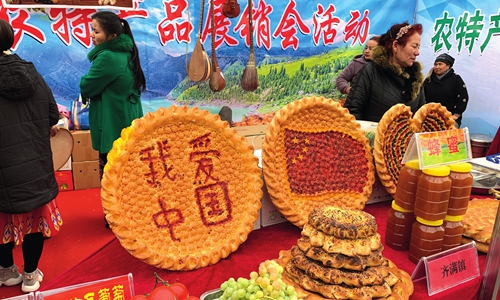
Agricultural products and king-sized pies are displayed at a trade fair in Kuqa County, Xinjiang, on Saturday. Photo: Li Xuanmin/GT
Question: The New York Times called Xinjiang vocational education and training centers "internment camps," and alleged that students returning home during summer vacation could not see their family members. What is your comment on this?
Answer: Xinjiang set up the vocational education and training centers according to law, and they are schools in nature. The New York Times mistakenly called them "internment camps," which is totally irresponsible.
The vocational education and training centers are schools in nature, and use boarding management. The trainees can go home and ask for leave at any time. The trainees have the freedom of communication. Trainees' relatives are totally aware of the education and training that they receive. Their families can call and have video-chat with them, and visit them at the centers.
The vocational education and training program in Xinjiang has achieved good results since its implementation, and has received positive comments from the international community. Since the end of 2018, more than 70 delegations of over 1,000 people from 91 countries and regions have visited Xinjiang, including senior UN officials, foreign envoys to China, delegates of international organizations, permanent representatives of different countries to the UN office at Geneva, journalists of foreign media and leaders of religious groups. Through field trips, many of them have seen the truth and come to understand that it is a necessary, legal and reasonable effort to carry out the vocational education and training in Xinjiang. They have all expressed that the terrorist activities which occurred in the region were brutal, inhumane and outrageous, and that the vocational education and training program has made important contributions to international efforts to fight terrorism and extremism, and generated valuable experience that is of great reference value.
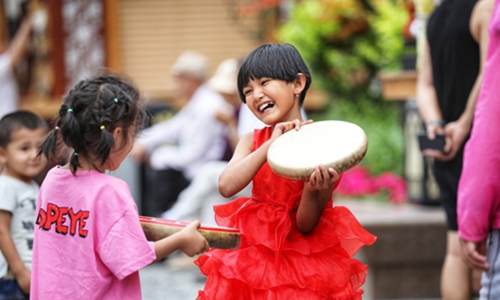
Children in Xinjiang Uyghur Autonomous Region Photo: Cui Meng/GT
Question: In a recent Xinjiang-related report from the New York Times, the July 5 riot was called an ethnic resistance suppressed by the government. What is your comment on this?
Answer: There has long been a final verdict on the July 5 riot in Urumqi, and many mainstream foreign media reported the facts of the incident 10 years ago. In the riot, the "East Turkistan" forces at home and abroad colluded with each other in organizing, plotting and committing serious violent crimes - beating, smashing, looting and arson, killing 197 people including Uyghurs, injuring more than 1,700, and causing immeasurable property loss. Until today, many families have not yet come out of the shadows as the trauma still lingers.
Instead of condemning the heinous and inhumane violent terrorist activity, The New York Times glorifies it as an "ethnic resistance." This is a typical representation of double standards on counterterrorism and de-radicalization. It violates basic professional ethics and human conscience, and is despised by all good and just people. According to the logic of The New York Times, aren't the September 11 attacks also an ethnic resistance, suppressed by the US government?
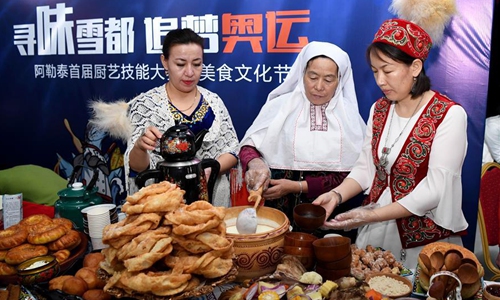
Women of Kazakh ethnic group show their traditional food in Altay, northwest China's Xinjiang Uygur Autonomous Region, Nov. 27, 2019. The 14th Xinjiang Winter Tourism Trade Fair opened here on Wednesday. (Xinhua/Sadat)
Question: The New York Times report said families of trainees at the vocational education and training centers are discriminated against. Can you tell us the truth?
Answer: Government at all levels in Xinjiang treat the trainees' families equally as other people, and help them solve problems with employment, medical services, education and poverty alleviation over time. They enjoy equal policies in their basic living allowance, free health examinations, endowment insurance, medical insurance, and accident and injury insurance. Children of the trainees can equally enjoy 12 years of free education, and those in the four prefectures in Southern Xinjiang can enjoy 15 years of free education. All candidates from their families who are admitted to college can enroll successfully, and those from in-need families receive government subsidies and can be employed normally after graduation just like other students. For example, Reziwanguli Alimu from Cele county, Hotan Prefecture, studied at a vocational education and training center. Not only were her family members not discriminated against, but the local government also subsidized her family when they were building an anti-quake house, and her mother received a basic living allowance according to the government policies. Another example: while Abulaiti Aimaiti from Yingjisha county, Kashi Prefecture, received vocational education and training at a center, his daughter was recruited as a teacher by a primary school in the county without any discrimination or influence after her college graduation.
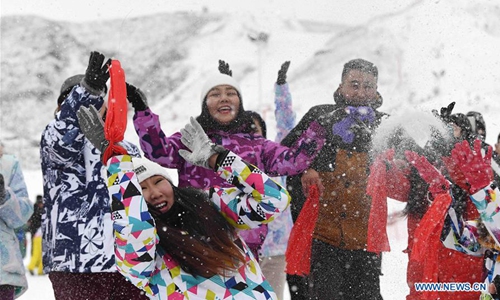
People take part in a carnival at a skiing field on Jiangjun Mountain in Altay, northwest China's Xinjiang Uygur Autonomous Region, Nov. 27, 2019. The 14th Xinjiang Winter Tourism Trade Fair opened here on Wednesday. (Xinhua/Sadat)
Question: Earlier this year, Olsi Jazexhi, a journalist from Albania, visited Xinjiang and said that he saw with his own eyes that Xinjiang was carrying out a massive genocide, and that the vocational education and training centers were an Alcatraz prison in the middle of the desert. What is your comment on this?
Answer: From August 17 to 23, 2019, Olsi Jazexhi made a field visit to Changji, Aksu and Kashi in Xinjiang with more than 20 foreign media representatives from 16 countries such as Russia and Turkey. Despite the fact that Olsi Jazexhi said during his visit that the studying and living conditions in the vocational education and training centers were very good, he ignored the facts and spread false information to the public when he returned home. The videos he published do not contain any pictures or recordings of interviews in Xinjiang. He is talking entirely on his own. This kind of behavior seriously violates the basic professional ethics of journalism, and the intention is evil.
In fact, all other members from the foreign media delegation who had visited the same places reported the opposite of what Olsi Jazexhi did. For example, Dimitri Yevgeny, a political commentator and China specialist from RIA Novosti, said in an interview - which I will directly quote - that, "I have seen that this is a school, it's a way to combat terrorism. We are combating terrorism in Russia, and we have a lot to learn from China. We need to cooperate and face the challenge together. The measures China took can be examples for other countries." The chief editor of Mongolian newspaper Ben Menghetula said in an interview that, "Before I came to Xinjiang, China, I heard some media reports said that the Chinese government had gathered lots of young people in concentration-camp-like places, brainwashed them and did not allow them to go out, so on and so forth. But after I came to the vocational education and training center and saw it with my own eyes, I realized that it was all ill-intentioned propaganda made by the Western media." Rustam Atovulloev, an expert of human rights in Uzbekistan, said that "China has always protected the rights of people who believed in Islam and the development of Islam as well. The statistics shared by the Chinese government indicate that at present, there are 24,300 mosques and the Muslim population has reached 11.3 million in Xinjiang."
Since the end of 2018, nearly 1,000 people from more than 90 countries and regions have visited Xinjiang. They have all recognized that the comprehensive de-radicalization measures adopted by the Xinjiang authorities, such as offering the vocational education and training programs, have made an important contribution to international efforts to fight against terrorism and extremism, and accumulated valuable experience of significant reference value. The vicious deeds carried out by Olsi Jazexhi will not succeed.
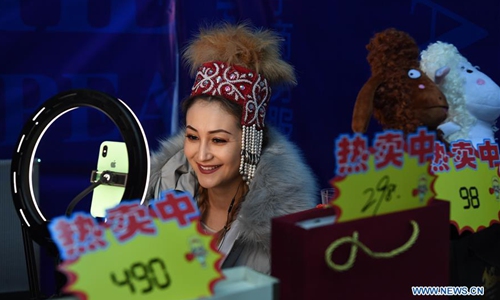
A live-broadcast consultant promotes agricultural products for a company at a fair in a gymnasium in Altay, northwest China's Xinjiang Uygur Autonomous Region, Nov. 27, 2019. The 14th Xinjiang Winter Tourism Trade Fair opened here on Wednesday. (Xinhua/Sadat)
Answer: Since the end of 2018, nearly 1,000 people from more than 90 countries and regions have visited Xinjiang, including foreign diplomatic envoys to China, officials from international organizations and representatives from the media. They have seen that people in Xinjiang are living happy and fulfilling lives with political stability, economic vitality, and social harmony. But Wang Songlian has never been to Xinjiang. What he said was vicious speculation.
Similarly, Shi Jianyu made irresponsible remarks, saying that holding a foreign passport makes you suspect in Xinjiang. Xinjiang is an open area. In 2018, the region registered more than 150 million trips by domestic and international tourists. Among them, 2.4 million were international visitors, witnessing a year-on-year growth 10.78 percent. They came to Xinjiang with great interest and returned with satisfaction, thinking highly of Xinjiang.
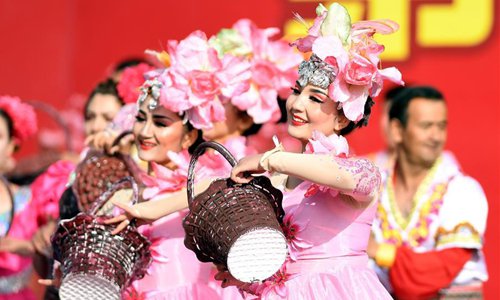
Actresses perform during a jujube harvest festival in Qiemo County, northwest China's Xinjiang Uygur Autonomous Region, Oct. 19, 2019. Qiemo County, situated in the Mongolian Autonomous Prefecture of Bayingolin and on the edge of the Tarim Basin, is known for high-quality jujube production. (Xinhua/Sadat)
Question: According to the report, more and more evidence shows that there has been forced labor in the vocational education and training centers in Xinjiang. What is your response?
Answer: The vocational education and training centers in Xinjiang provide various courses to the trainees, such as the standard spoken and written Chinese language, knowledge of laws and regulations, vocational training programs and de-radicalization courses. To remedy a lack of occupational skills and employment difficulties, vocational skills-training programs are offered. The education and training centers regard vocational skills as an important step to improving the trainees' ability to find jobs. Based on local demand and employment conditions, the courses may include food processing, typesetting and printing, hairdressing and beauty services, interior design and decoration, livestock breeding, horticulture, therapeutic massage, household services, handicrafts, flower arrangement, rug weaving, painting, performing arts such as music and dance, and so on. Eligible trainees can pick up more than one skill if they wish. The courses are delivered in two categories: theoretical studies taught in classrooms and actual skills practiced in workshops. Practical training is conducted after trainees have mastered the theories to improve their skills, and no actual products are made. Hence, the so-called forced labor does not exist at all. Most of the trainees have enhanced their employment abilities through the education and skills-training programs.
After completing their training programs, trainees are free to find jobs on their own, or gain employment with the assistance of relevant authorities. Many trainees have gone on to find employment in factories or enterprises, and some have even started their own businesses. Some of them have chosen to continue their studies in local secondary and higher vocational schools in order to prepare themselves better for the future. Qualified trainees who find employment in enterprises sign contracts of labor as formal staff and have their salaries paid according to the Labor Law and Labor Contract Law of the People's Republic of China. But production activities performed for their employers and the products sold by these factories and enterprises have no relation to the vocational education and training centers.
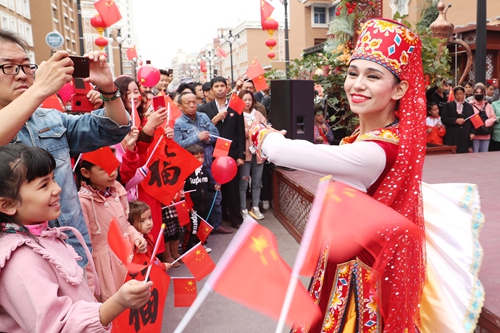
Residents in Urumqi, regional capital city of Northwest China's Xinjiang Uyghur Autonomous Region celebrate the 70th anniversary of the founding of the People's Republic of China on October 3. Photo: VCG
Question: It is reported that Darren Byler, an anthropologist of George Washington University, and Adrian Zenz, a scholar on China, alleged that Xinjiang had interned over 1 million Uyghurs, Kazaks and other Muslim minorities who all are subject to persecution in internment. What's your answer to such allegations?
Answer: As far as I know, Darren Byler and Adrian Zenz are the hardcore members of the "research group on Xinjiang's education and training centers," an academic body allegedly set up and controlled by US intelligence agencies. They coordinated with anti-China forces within the US to spread false and purely fabricated remarks on Xinjiang in the capacity of alleged experts. They would do anything they could to defame and smear Xinjiang with groundless academic findings as support, which are, of course, the typical tricks used by some Americans.
These centers are education and training institutions in nature. They employ a residential-education model which allows trainees to go back home on a regular basis and ask for leave to attend to personal affairs. Trainees also enjoy the freedom of correspondence. The centers guarantee that trainees' personal dignity is inviolable, and prevent insults or abuses in any manner. A report from Turkey's DHA on May 15, 2019, said, "The centers provide human-based management and services for the trainees. There is no maltreatment or restrictions on personal freedom. The trainees are happy to study and live there. What I saw and felt during the visit was very different from the negative propaganda of the US and other Western countries, and I felt their double standards were simply rude and unreasonable."
The number of trainees in the education and training program is not fixed; some are coming in while others are going out. As education and training work is effectively advanced, the vast majority of trainees have attained the training criteria and completed their courses, and they are working and living well. The "1 million people" claim is totally baseless, complete distortion and fabrication.
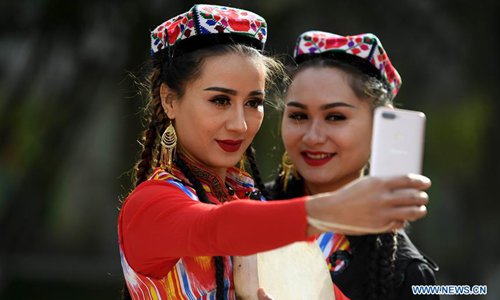
Actresses take a selfie during a culture and tourism festival themed on Dolan and Qiuci culture in Awat County of Aksu Prefecture, northwest China's Xinjiang Uygur Autonomous region, Oct. 25, 2019. The festival kicked off recently in Aksu Prefecture. (Xinhua/Sadat)
Question: What is the composition of students like in the education and training centers? What is the legal basis of the program? Is it directed against specific minorities?
Answer: In accordance with the Counter-terrorism Law of the People's Republic of China, the Measures of the Xinjiang Uyghur Autonomous Region on Implementing the Counter-terrorism Law of the People's Republic of China, the Regulations of the Xinjiang Uyghur Autonomous Region on De-radicalization, and other laws and regulations, vocational education and training centers have been established in Xinjiang. Trainees at the centers fall into three categories. First, people who were incited, coerced or induced into participating in terrorist or extremist activities, or people who participated in terrorist or extremist activities in circumstances that were not serious enough to constitute a crime. Second, people who were incited, coerced or induced into participating in terrorist or extremist activities, or people who participated in terrorist or extremist activities that posed a real danger but did not cause actual harm, whose subjective culpability was not deep, who acknowledged their offences and thus did not need to be sentenced or could be exempted from punishment, and who have demonstrated a willingness to receive training. Third, people who were convicted and received prison sentences for terrorist or extremist crimes and have been assessed as still posing a potential threat to society after serving their sentences, and who have been ordered by people's courts in accordance with the law to receive education at the centers.
The specific procedures for carrying out education and training in Xinjiang require that relevant authorities determine the nature and circumstances of acts and deal with the above three categories of trainees in accordance with laws and regulations such as the Criminal Law, Criminal Procedure Law and Counter-terrorism Law. The first category should be initially handled by public security organs, and then given assistance and education by vocational education and training centers. The second category should first be investigated by public security organs; if the procuratorial body, after reviewing a case, makes the decision not to institute legal proceedings, the trainee in question should then be given assistance and education by the education and training centers. The third category, when found to pose an ongoing risk to society after being assessed prior to their release from prison, shall be placed at such centers to receive education to help them reintegrate into society in accordance with the decision of people's courts.
The education and training work in Xinjiang is always based on facts and laws, without targeting any specific region, ethnic group or religion.
Since their initiation, there has never been a foreigner in Xinjiang's vocational education and training centers. Recently, the Australian Broadcasting Corporation falsely claimed that Xinjiang had captured 23 Australian citizens, and that 15 adults and 6 children from the Uyghur community in Australia had been detained. This is pure fabrication and denigration, which violates press ethics.
Newspaper headline: An exclusive interview with the spokesperson of the Xinjiang regional government on distorted reports about Xinjiang by some overseas media and organizations